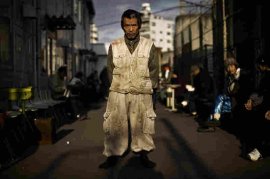

- Shiho Fukada's four-part photo series documents the effects of Japan's changing economy on both the young and the old. Here, Cocoa, 21, shows off her business card for her job as a "hostess." Working as a hostess is a popular job for Japan's young women. But it comes with an expiration date — when they get too old, they are no longer wanted, leaving them with no skills and few options.
Courtesy of Shiho Fukada/Panos Pictures
- Chapter 1: Dumping Ground of Old Men in Japan — End Of Labor Town. People wait in line to receive a charity meal in Kamagasaki, Osaka, Japan. Once a thriving day laborer's town, Kamagasaki is now home to about 25, 000 mainly elderly day laborers, with an estimated 1, 300 who are homeless.
- Yasu, an unemployed day laborer, drinks sake in Kamagasaki. It used to be called a "laborers town" but is now called a "welfare town" — a dumping ground of old men. Alcoholism, poverty, street death, suicide, TB and most of all loneliness prevail here.
Courtesy of Shiho Fukada
- Men mop the floor of a labor center, which is sponsored by the government and provides the main source of income to a select few in Kamagasaki. People used to be able to get high-paying jobs in this town, but now there is no work, especially for the aging male population.
Courtesy of Shiho Fukada
- A picture of Mount Fuji hangs under a highway where a homeless man sleeps in Osaka, Japan.
Courtesy of Shiho Fukada
- Syunsuke Fujii, 64, an unemployed carpenter, is seen in Osaka, Japan. It is almost impossible for graying men of the construction industry to get work here.
- The remains of workers with no relatives sit in a locker room of an NGO in Osaka, Japan. Many men here don't have family ties, and live and die alone as social outcasts from the mainstream "salaryman" culture.
Courtesy of Shiho Fukada
- Chapter 2: Overworked To Suicide. Suicide and karoshi — death by work — is increasingly common among white-collar workers as a reaction to stress. Emiko Teranishi, 61, lost her husband, Akira, from suicide 14 years ago. He was a manager of a restaurant chain but became depressed from excessive overwork. He ended his life by jumping from a building.
Courtesy of Shiho Fukada
- Japanese businessmen play pachinko after work in Tokyo. Japanese white-collar workers, also known as "salarymen, " increasingly work longer hours because of the fear of losing jobs and a shortage of manpower. Excessive overwork causes depression, and in some cases leads to suicides.
- A Japanese businessman waits for a train under LED lights, which are designed to calm people and prevent them from jumping onto the tracks in Tokyo. Japan has one of the highest suicide rates in the world.
Courtesy of Shiho Fukada
- Cocoa, 21, prepares for work in the dressing room of a bar in Tokyo. Customers pay large sums of money to hostesses for the pleasure of their company, but not for sex. Japanese women's employment opportunities are often limited, and many see hostessing as a path to financial independence — even though they can only do it while they are young.
Courtesy of Shiho Fukada
- Aya, 21, sends text messages to her clients as she brushes her teeth before work. She emails about 50 clients at least three times a week. "I'm increasingly depressed and closed off, but I have to keep smiling, " she says.
Courtesy of Shiho Fukada
- Ku, 24, entertains her customer in Tokyo. She wanted to be a hostess from the time she was 16 years old. Many hostesses suffer from various health problems such as liver disease and alcoholism, caused by late nights and constant drinking.
Courtesy of Shiho Fukada
- Chapter 4: Internet Cafe Refugees. Fumiya, 26, a security guard, has lived in an Internet cafe for 10 months. People live in the 24-hour cafe's small rooms, unable to afford rent anywhere else. Fumiya pays about $25 a day for a tiny private booth, a shared bathroom and laundry service.
Courtesy of Shiho Fukada
- Tadayuki Sakai, 42, worked for a credit card company for 20 years, and now is a telephone operator and computer temp. He lives in this Internet cafe. The number of temporary low-paid workers without benefits and job security has surged in the past decade, reaching a third of Japan's workforce.
Courtesy of Shiho Fukada
The first part of Fukada's series documents the plight of old men in a dying labor town. Courtesy of Shiho Fukada/Panos Pictures hide caption
itoggle caption Courtesy of Shiho Fukada/Panos PicturesThe first part of Fukada's series documents the plight of old men in a dying labor town.
Courtesy of Shiho Fukada/Panos PicturesPart two explores the rise of "karoshi" — or "death by work" — a rising trend among white collar workers due to extreme stress. Courtesy of Shiho Fukada/Panos Pictures hide caption
toggle caption Courtesy of Shiho Fukada/Panos PicturesPart two explores the rise of "karoshi" — or "death by work" — a rising trend among white collar workers due to extreme stress.
















